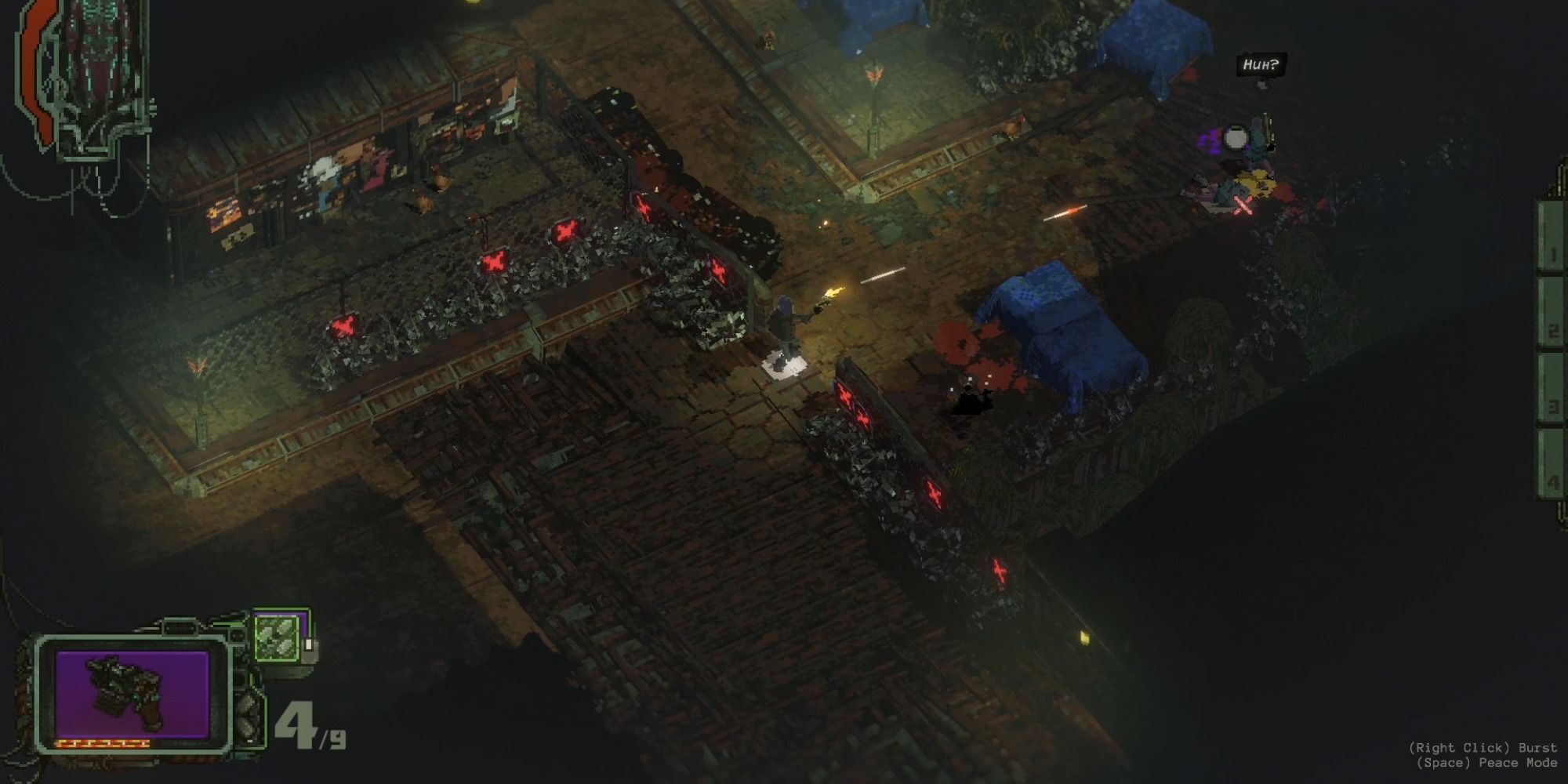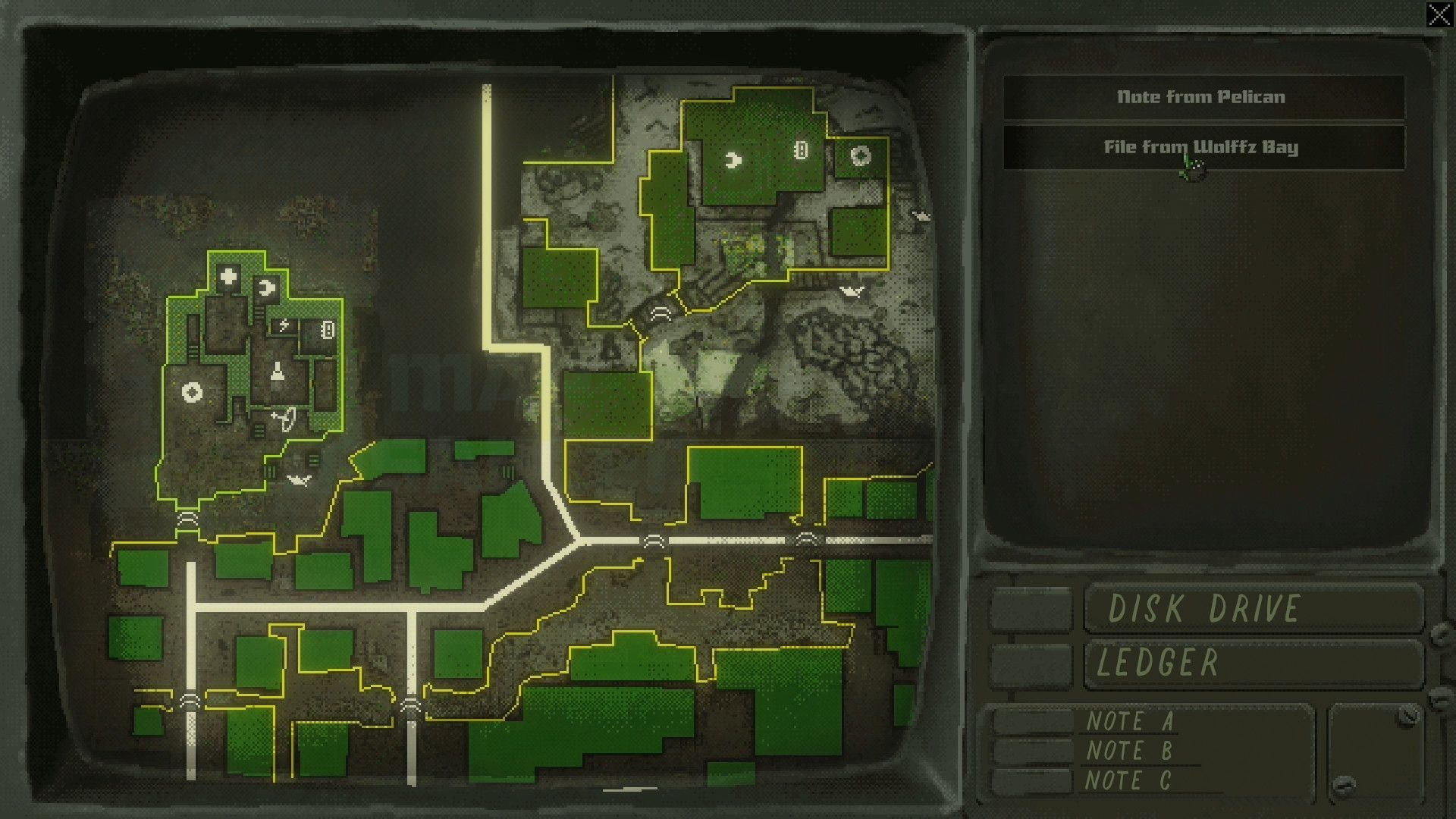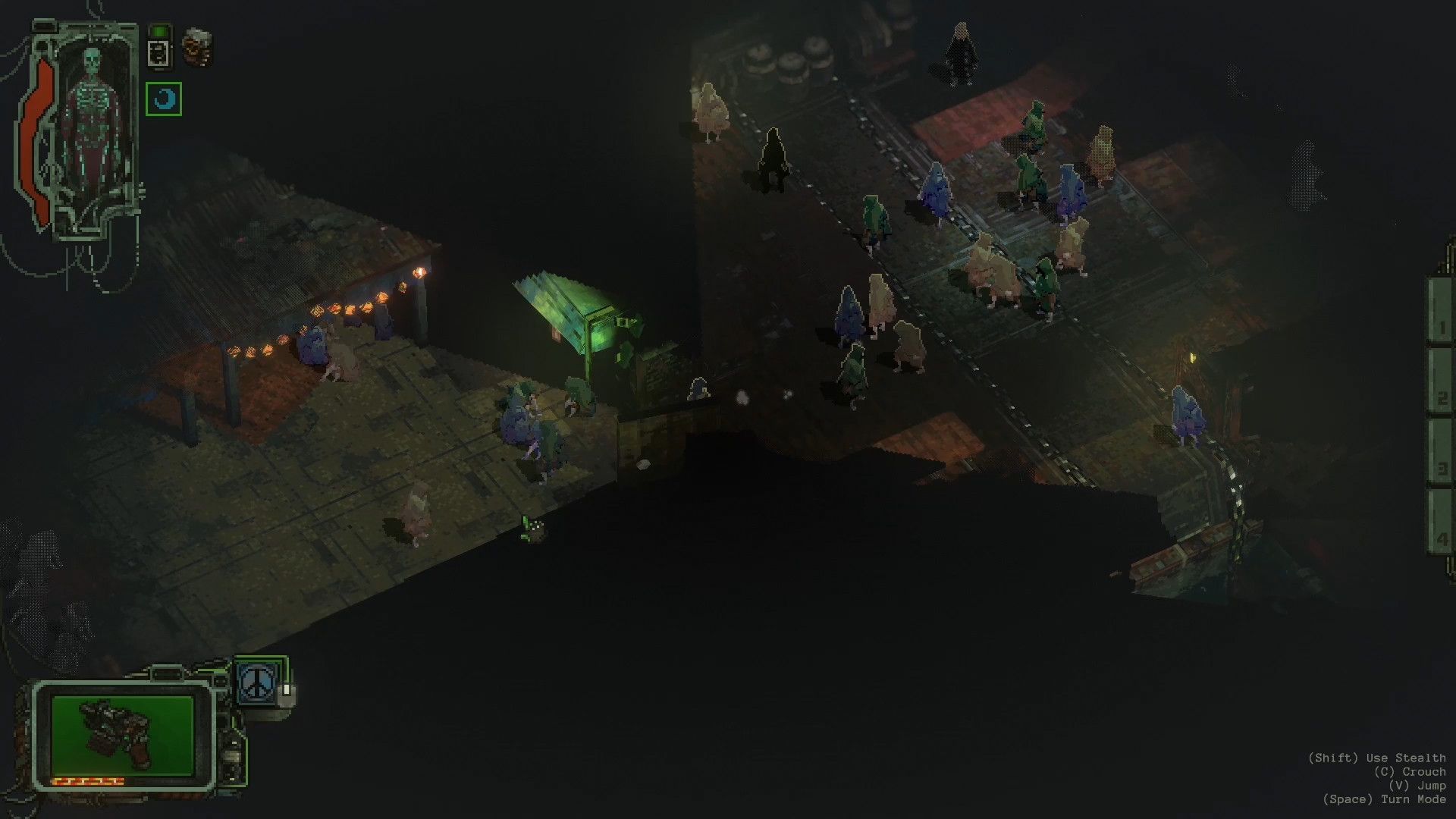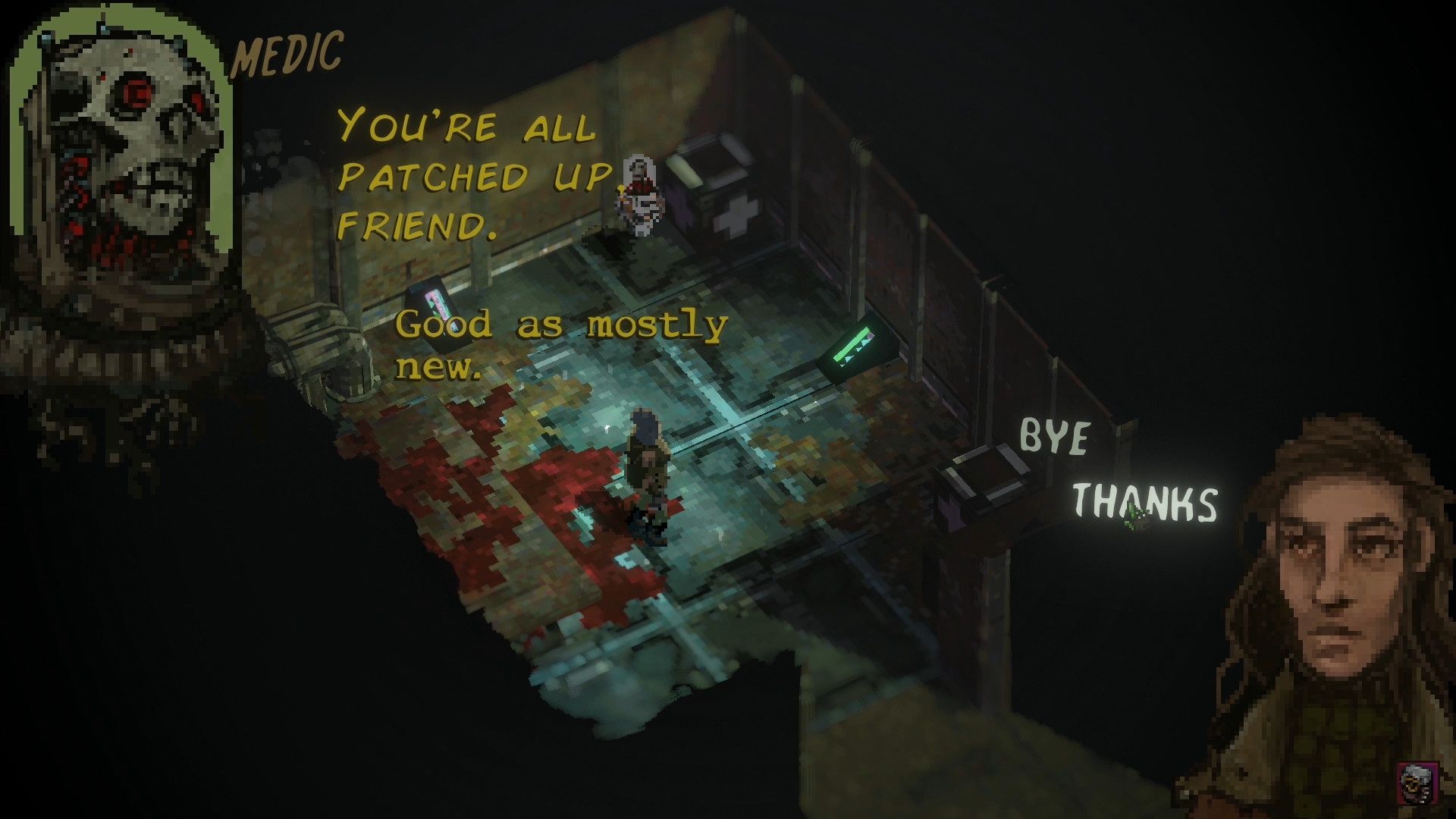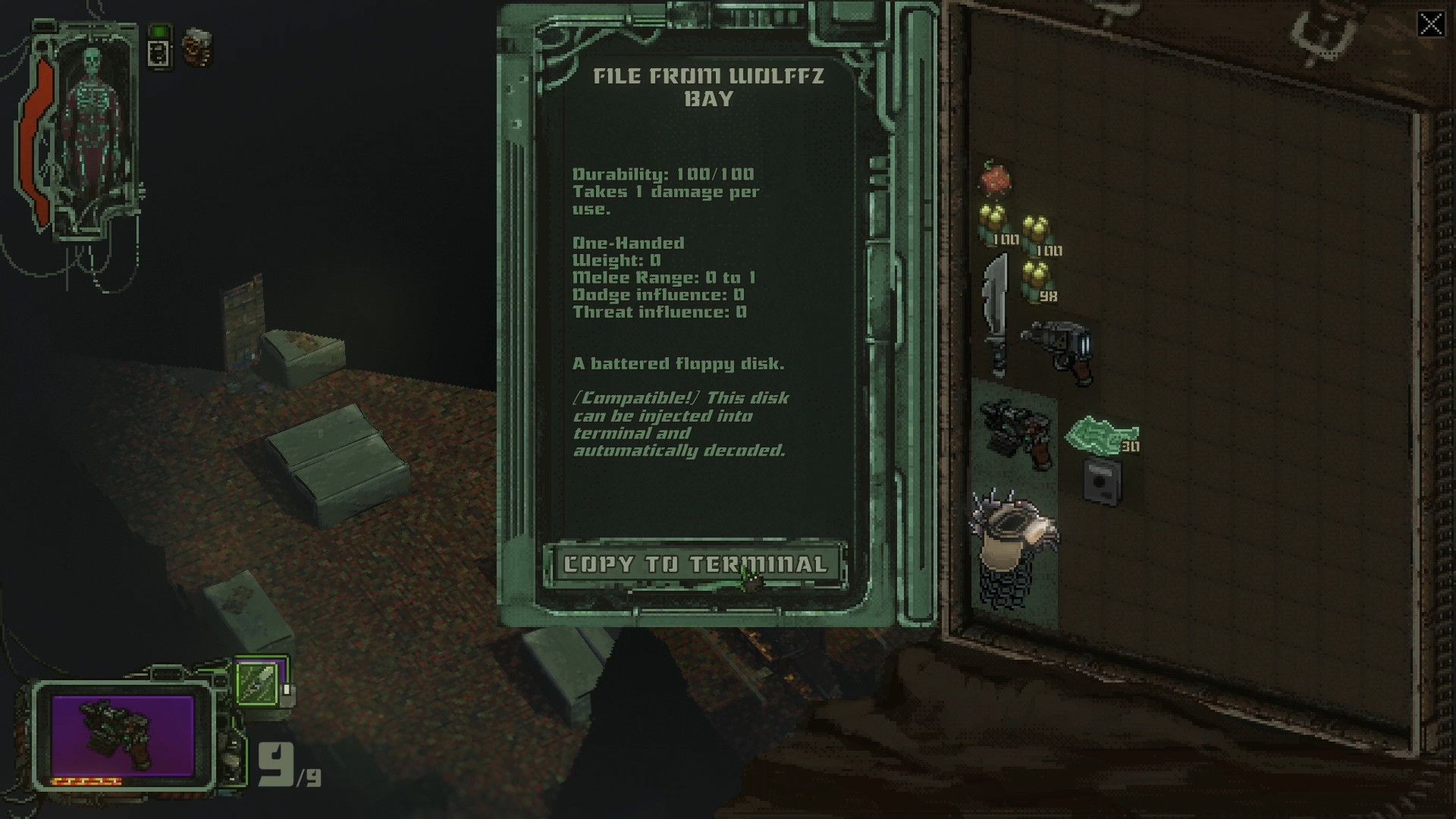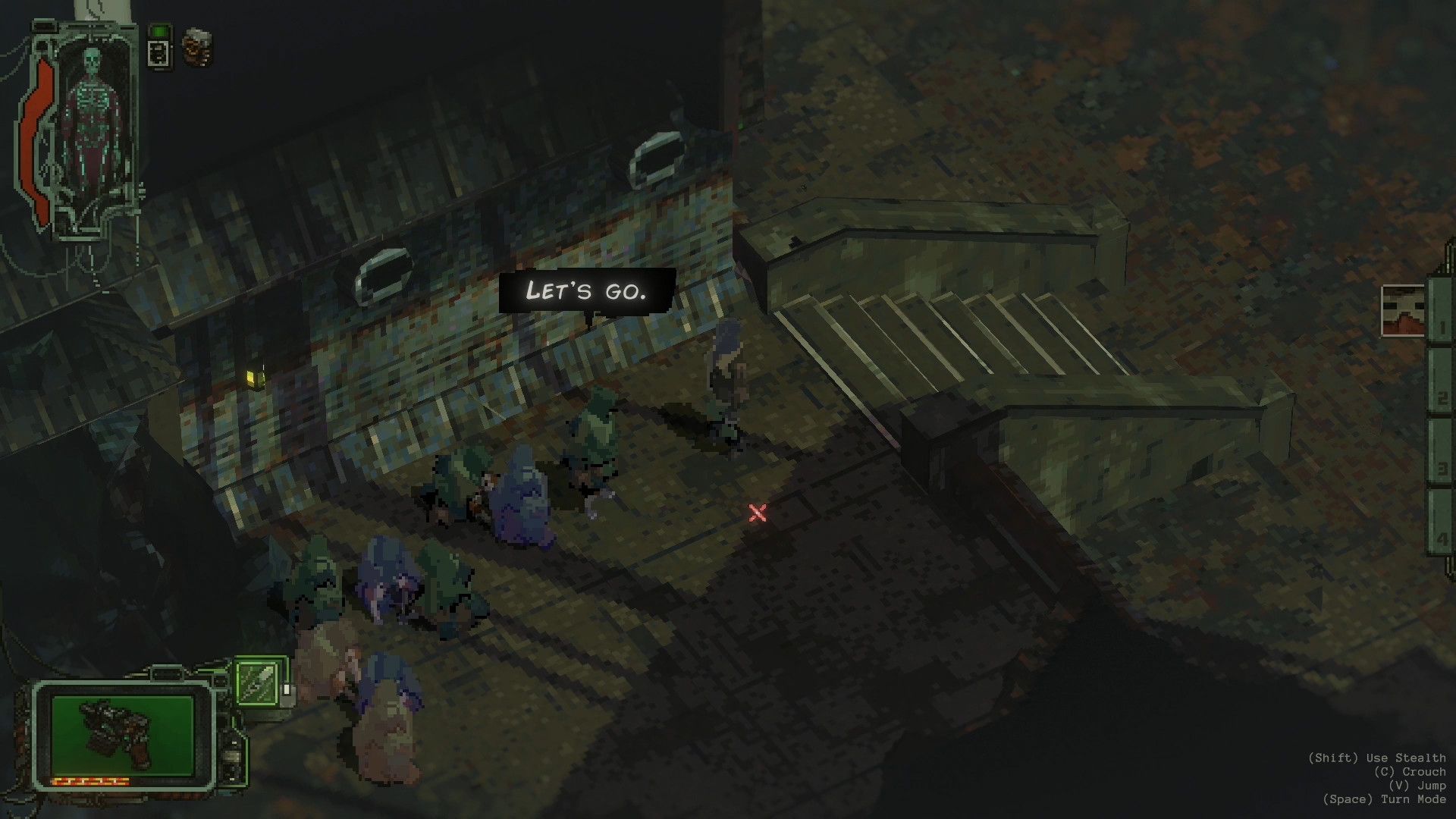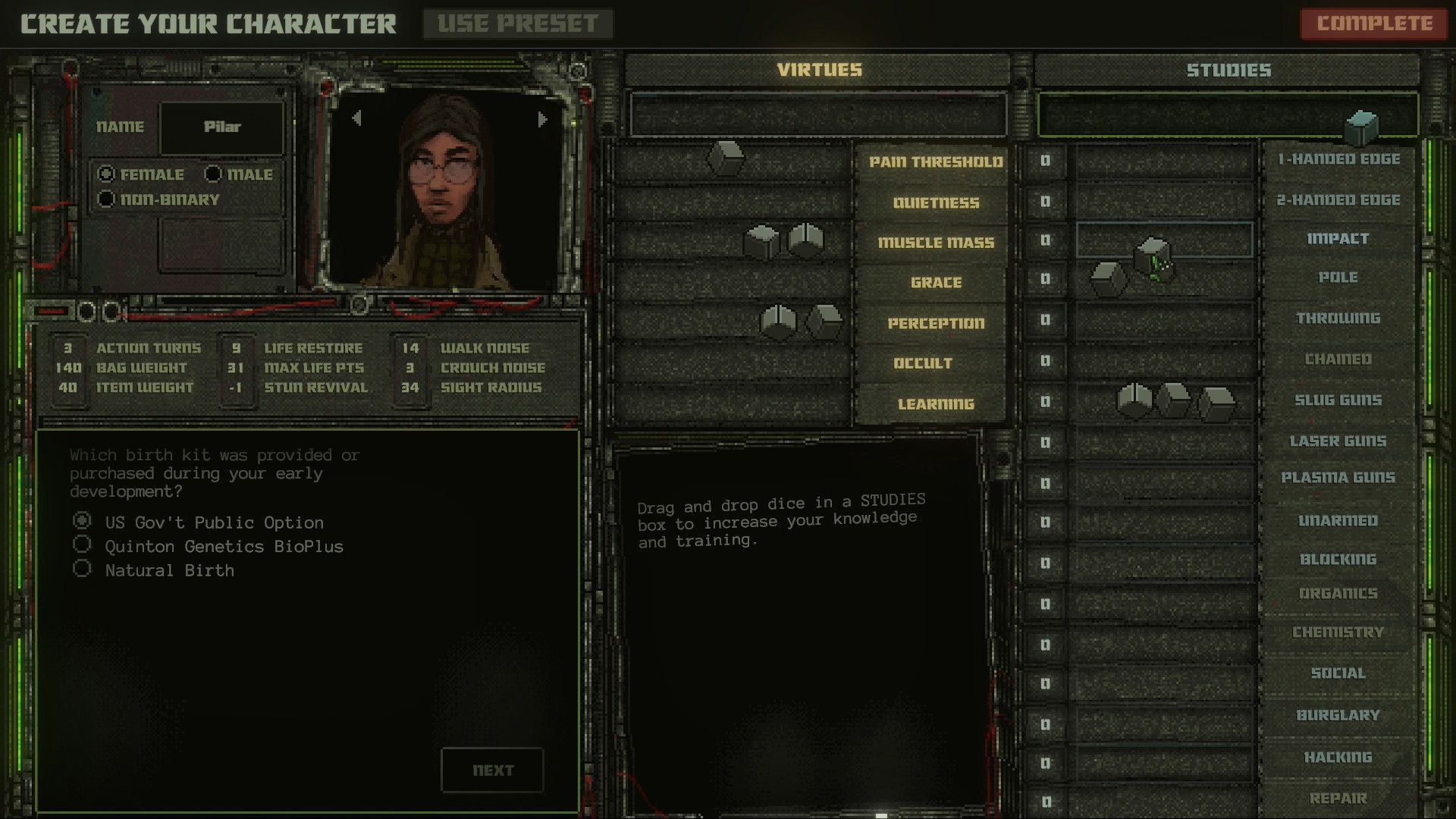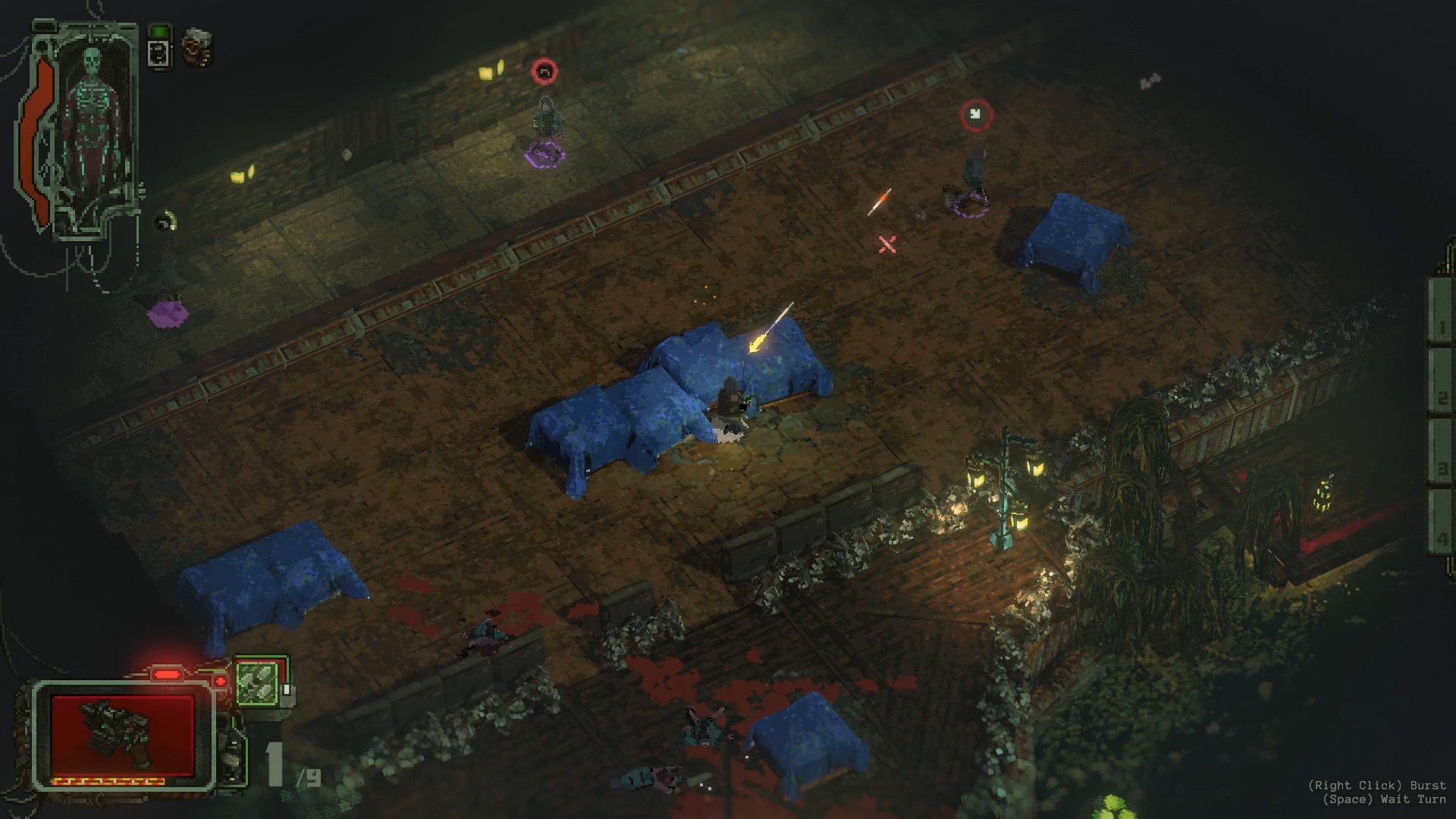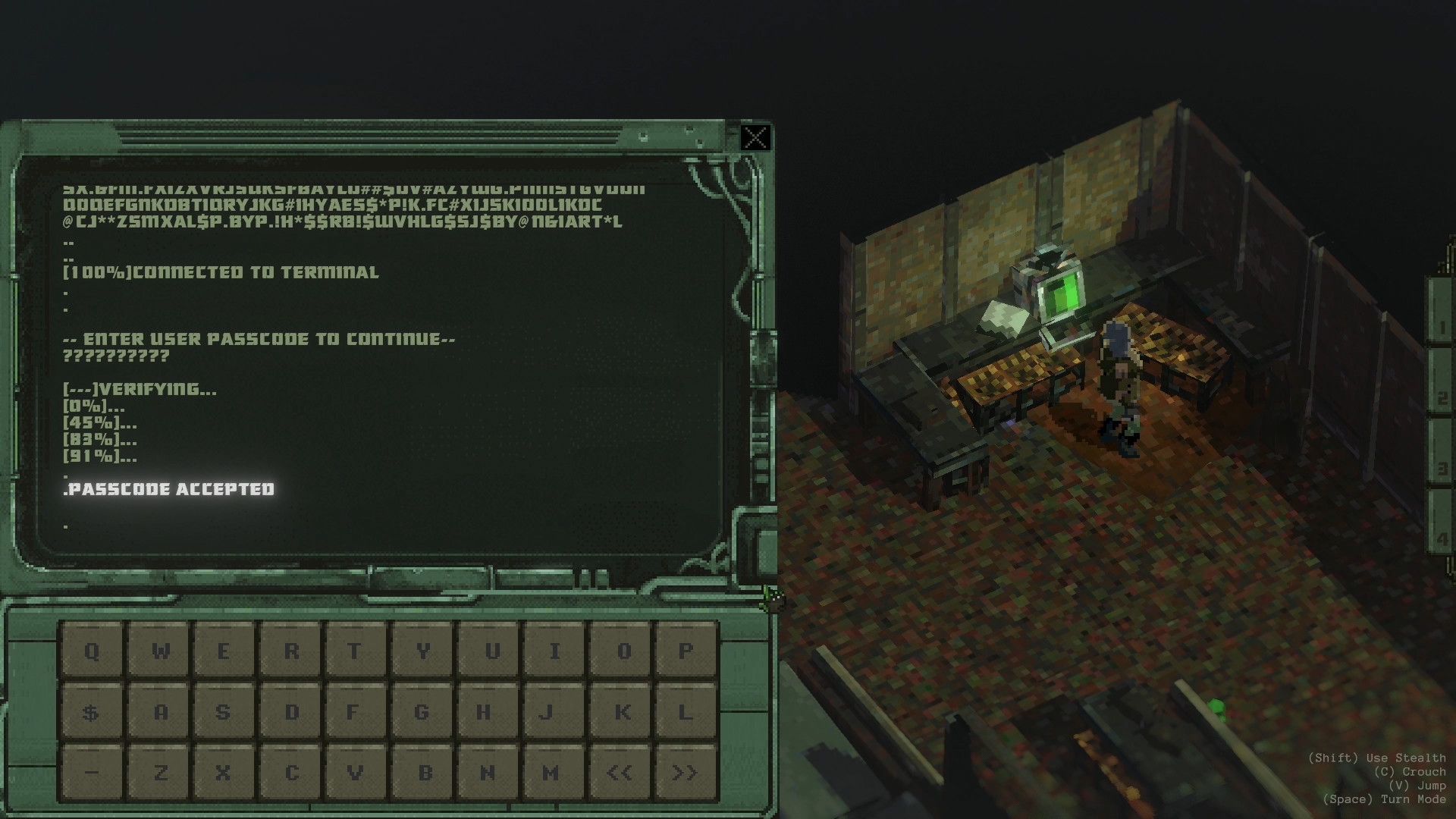“We tried to think of a beginning as a DM, saying: you're escaping this war you were drafted into and you were brainwashed the whole time - who did you want to be back on Earth?”
Developed by indie duo Joseph and Hannah Williams at Whalenought Studios, Mechajammer is a tactical cyberpunk RPG set in an offworld jungle colony. As Joseph explains above - I’m referring to them by their first names on account of the couple sharing a surname and job title as joint-lead designers - this setting is as opportunistic as it is detrimental. While gluttonous billionaires pillage the galaxy and dilate the class divide at the heart of societal injustice, you and those courageous enough to rebel can find freedom in isolation from the corporate ideological corruption left to fester on Earth.
This dynamic is essential to Mechajammer from the second you decide to boot it up. The game intentionally eschews a rigid narrative for a more creative approach to storytelling. Your main objective is to simply survive in this hostile and oppressive world, which means a lot of its best stories are the ones you write yourself - the fact the game is heavily inspired by tabletop should come as a surprise to no one.
The plight for survival begins as soon as you create your character. For example, for every five years of your previous life, you choose a background job. While these choices flesh out your personality and identity, each job also comes with its own unique penalties that serve as negative modifiers to specific stats. By building your character up, you also actively knock them down, which indirectly accentuates how real and palpable they feel as your avatar in this hi-tech, low-brow universe.
Mechajammer is unique beyond this, though. As opposed to the typical sci-fi sheen we see in a lot of contemporary video games, it is sweaty, gritty, and extremely dirty. Whalenought specifically decided to juxtapose cyberpunk-esque digital cybernetics with more of a low-life, analogue world. Instead of science fiction spectacle like Mass Effect and similar games, with hover cars and skyscrapers and intergalactic councils, the events of Mechajammer transpire across slums, swamps, and jungles in a war-ravaged ex-mining colony. It’s this very distance that makes it so resonant.
“We don't really nail down a time period for when this takes place in the future, we keep that vague,” Joseph says. “But the whole idea is there's a collective government on Earth, and off in the colonies we've established all over the galaxy, there was a rebellion. People that now are the capitalists going into space obviously detach themselves from Earth, [and] that causes a big strike. It's a fascinating concept we're already beginning to [see] in 2021.”
“The seeds are being planted,” Hannah adds. “Our billionaires going into space could so easily be these syndicates we've set in these colonies in the future.” At its heart, Mechajammer is a thoughtful but damning vision of how poorly this future might turn out to be if we continue the way we’re going in the real world right now.
According to the devs at Whalenought, it’s difficult to make this kind of game without seeing how it relates to the world it was created in. In general, science fiction and fantasy have always been two of the most powerful allegories for paradoxically critiquing power structures in reality, although here, up in space colonies light years away from Earth-residing billionaire demagogues, said allegories are anything but subtle.
“The syndicates have a lot of workers, and the people on the street are ex-syndicate workers,” Hannah says. “They've been pulled up with cybernetics that are not functioning and their syndicates have abandoned them, so it's this culture of the rich versus the poor and how those two interact.”
“It's like the Amazon workers on the West Coast or in the warehouses today, where they're monitored,” Joseph adds. “The next step is you have to have certain bionics to be able to work effectively, and what happens when that goes wrong? [We were] taking that up to 11 and figuring out what happens to all these people when they're not employed on work colonies.”
Joseph and Hannah are both careful to state that Mechajammer is inherently fictional, and that even though there are parallels with modern society - which they address - they’re not necessarily trying to make largesse statements as much as they are providing you with a world you can write your own stories in and draw your own conclusions from. You’re mostly seeing the day-to-day failures of keeping up with the populace, and how these failures influence those who have been emphatically failed.
“You're stuck on this colony, you're these misfits in society, and you're trying to get out,” Joseph says. “It's a pretty simple concept, but you're surrounded by other people that are also stuck. It's a fun backdrop being in that shadow of the high, glossy syndicates that you're always surrounded by. It's like Jeff Bezos creating his giant jungle domes in downtown Seattle. We lived there when he built that. There'd be people in tents outside of it. It's just like, ‘Oh, no, what’s happening? I feel like I'm watching RoboCop from my window.’”
Speaking of RoboCop, Mechajammer takes massive inspiration from Paul Verhoeven’s 1987 classic. However, it is also extremely interested in games, particularly older ones like Deus Ex and the early Elder Scrolls titles, hearkening back to Joseph and Hannah’s shared love for tabletop-inspired experiences like Icewind Dale and Baldur’s Gate.
“Not holding the player's hand is something we're not seeing a lot of [anymore],” Joseph says. “I'm in my 30s at this point, but I miss that in games. In Deus Ex, your map was terrible. It was like an overhead shot from a drone, or a picture of the front of a building. And it was like, ‘Oh, this is stupid.’ But it was great, because then you get to figure out how to navigate around yourself. You go through apartment buildings and you're like, ‘Alright, that's the building.’ We wanted to build that whole system into this - giving the player less direction allows them to create their own stories. The biggest goal for us in a game like this is letting the player know what they have available, what's going to happen, and then letting them run loose with that knowledge.” Joseph cites Daggerfall as an example of this kind of design because the world was built around the player, as opposed to vice versa.
Still, Mechajammer’s main influences consist of movies like the aforementioned RoboCop, Escape from New York, Total Recall, Blade Runner, and Terminator. While these films had a clear impact on Mechajammer’s aesthetic, the game is also designed around similar themes. In fact, the two are not necessarily mutually exclusive from one another - when it comes to cyberpunk, aesthetic is one of the most powerful thematic modes you can work with.
“We tried a lot of art styles but we really wanted that grit, that sweaty ‘70s, ‘80s movie where they don't have a lot of makeup on and everybody's messy,” Joseph says. “It’s easy to make a slick looking sci-fi game with shiny surfaces on specular maps. We think cyberpunk and we think, ‘This is disgusting.’ It should be horrible looking. And so all the streets, there's just trash and grit everywhere.”
“The pixel art definitely helps with that gradient,” Hannah adds. “It seems like a match made in heaven.”
“It keeps it abstract, you know?” Joseph says. “What is this surface general metal? I don't know. It's 500 colours of pixels that look weird. I'll make it up in my head - and it's like a tabletop game, so you should.”
All of this combines to create a solid cyberpunk setting with a legitimate cyberpunk message. After discussing Blade Runner 2049’s hazy, acidic smoke and the film’s spontaneous shift to the desert, Joseph cites iconic anime Ghost in the Shell’s jungles as an inspiration for Mechajammer’s overgrown mining colony, and explains why so much of the cyberpunk we see never quite gets what the genre is supposed to be.
“There's always that sheen and gloss in sci-fi,” Joseph tells me. “Cyberpunk just isn't a great use for that. It's too shiny and happy for what should be a warning. It's dystopian, it should be sad looking. And you kind of get that in a more realistic, trashy, sweaty, analogue world.”
“When I picture what the future looks like, the cyberpunk ways it's going - I picture it looking dirty and gritty,” Hannah says. “We live in Chicago. When you walk around downtown Chicago, it's not shiny. It's pretty trashy, and grey and brown and kind of smelly, and everyone's sweaty. It looks more like our game than something from Cyberpunk 2077, which isn't how I picture the future of cities looking in any way. How would you keep it so shiny? You're barely surviving. Metal corrodes and asphalt gets cracked and everything gets dirty and there's no time or resources to clean things up.
“Part of that feeling of being forgotten - the lower classes and workers not being taken care of and the rich-poor stratification… You don’t have the resources to take care of your streets and shiny things. You're using used cybernetics that have already started corroding and rusting. I don't know, it seems like the vision of the future, at least in our heads. Hopefully that is not our future.”
Mechajammer doesn’t pull its punches when commenting on these ideas. Although the entire game is set on an offworld jungle colony, there’s more nuance to its topography than tons of trees. Throughout the jungle itself, tubes snake their way through the grass, indicating that the jungle wasn’t always so dense and that an older city is buried beneath it. When you burrow your way down, you’ll come across haunted syndicates and unspeakable horrors, although their significance is deliberately left ambiguous.
“A lot of it is best left to the imagination,” Joseph says. “We enjoy that restraint of not saying, ‘And this is the history of this area.’ There's definitely hard facts of what these things are, but from the player’s perspective, they can kind of try to piece that together on their own.”
“We've talked about this game being inspired by Escape from New York, and I think that movie is built on restraint,” Hannah adds. “I know it was built on a small budget, which kind of led to that restraint. But there's so much of that movie where you just don't know what the other streets of New York City look like. You're also walking through green fog and you don't have a lot of backstories, but all of those question marks just make it more mysterious unless you fill in the blanks in your head.”
“Even like Blade Runner, the main lead you're following, they don't say a lot,” Joseph explains. “Would it be better if they did? No, it would be terrible. Leave it up to the imagination. As an audiovisual interactive medium, I think relying on a lot of text is often the laziest thing a developer can do. I think a lot of people enjoy visual novel games or visual novel-like RPGs. Those have, of course, become popular. But there's such an interesting story to tell with all the other aspects of the game. You’d hope that it becomes popular again.”
This is a major point of conversation throughout our chat about Mechajammer - that desire for studios to return to the kind of ambitious games that lean heavily into their identity as being emphatically that: games. Mechajammer is, in and of itself, the type of game that Hannah and Joseph Williams wish other developers would make today. As Hannah says, “It would be hard to work on a game we didn’t want to play.”
“Hopefully, other people enjoy it too,” Joseph adds. “Hopefully there are more games that are more laid back and casual. We think of something like Morrowind - not a perfect game by any means, but you really got that immersive, ‘I'm in an alien world here - what do I do?’ The story was okay, but the game was great. Everybody remembers that.”
As for how Mechajammer goes about integrating all of these ambitious ideas into one cohesive game… Well, it’s not out yet. That being said, some of the game’s ideas include: stealing from syndicates and allying with gangs; betraying said gangs and having assassins sent after you; collecting rumours in order to bribe people; deciphering alien languages or paying locals to translate them for you; investigating ancient occult groups buried deep beneath the jungle tubes, and much, much more. Depending on your origin, there are a variety of different ways to explore and exploit this world, where cyberpunk meets Orwell in a dirty, gritty dystopian future as surveillance trounces knowledge and only the truly rebellious are capable of escape.
All of that said, this is - as Joseph stated earlier and in true cyberpunk fashion - a warning. Unlike other modern games, you’re not the brave hero who stamps out evil and uplifts the oppressed. You are a broken, discarded syndicate pawn who is clawing their way not so much towards a better life as you are to life itself.
“It would be just too unrealistic for your player character to upend society and save this colony of its evils,” Hannah says. “We really try to imply that you will be forgotten. This colony is not able to be saved. The galaxy can't be saved.
“There's no world to save, it's already lost. Humanity's at the end of the road. Maybe you and your friends make it.”
Mechajammer is coming soon for PC. You can wishlist it on Steam.

